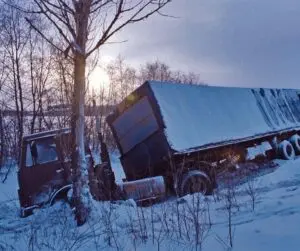 Driving in the winter or under various dangerous weather conditions can be a challenge, regardless of the vehicle you’re driving. Rain, snow, sleet, fog, and sun glare can all affect driver performance. Conditions affecting visibility and traction entail longer brake times with an increased chance of losing control of the vehicle.
Driving in the winter or under various dangerous weather conditions can be a challenge, regardless of the vehicle you’re driving. Rain, snow, sleet, fog, and sun glare can all affect driver performance. Conditions affecting visibility and traction entail longer brake times with an increased chance of losing control of the vehicle.
If you find yourself involved in a truck accident caused by dangerous weather conditions, your immediate priority should be safety—move to a secure location if possible and call emergency services right away. Following the accident, document the weather conditions with photos and gather witness information, as these details will be critical when working with insurance companies or Pennsylvania truck crash attorneys to establish how weather factors contributed to the accident.
The Dangerous Combination of Large Commercial Semi-Trucks and Adverse Weather Conditions
There are over 120,903 linear miles of roadways across Pennsylvania, on which far too many accidents occur due to adverse weather conditions. PennDOT has reported that in 2020 alone, there were 104,475 reported crashes, including 6,344 truck crashes on the Pennsylvania roadways. Of those 104,475 reported crashes, 24% occurred while the road conditions were wet, snowy, or icy.
As more traffic congests the roads, accidents grow more frequent, with more injuries and catastrophic results. Accidents involving semi trucks are usually more severe, mostly because of the weight disparity between semi trucks and the average passenger car. Often, the accidents that occur are caused by driver negligence or failed equipment. What happens when adverse weather conditions aggravate the negligent driving or failed equipment on highways and other roadways?
According to the U.S. Department of Transportation Federal Highway Administration (FHWA), adverse weather is the second largest cause of non-recurring congestion. Other examples of causes of non-recurring congestion are crashes, work zones, or vehicle breakdowns – circumstances that don’t normally cause congestion on a particular roadway. Conditions like snow, ice, and fog cause 15 percent of non-recurring delays. Likewise, even a light rain slows traffic down and can increase travel time delay by 12 to 20 percent. Travel time delays for semi-truck drivers can result in negative financial impacts. In metropolitan areas, truckers annually lose an estimated $3.4 billion (about 32 million hours) stuck in weather-related traffic delays.
Semi-truck drivers are under a great deal of pressure to adhere to their travel schedules in order to deliver the cargo that people depend on, such as raw materials, food, and supplies. As a result, many truck drivers may abandon safety protocol in an effort to deliver their haul on schedule.
Section 392.14 of Title 49 of the Code of Federal Regulations (C.F.R.) mandates the following:
§ 392.14 Hazardous conditions; extreme caution.
Extreme caution in the operation of a commercial motor vehicle shall be exercised when hazardous conditions, such as those caused by snow, ice, sleet, fog, mist, rain, dust, or smoke, adversely affect visibility or traction. Speed shall be reduced when such conditions exist. If conditions become sufficiently dangerous, the operation of the commercial motor vehicle shall be discontinued and shall not be resumed until the commercial motor vehicle can be safely operated. Whenever compliance with the foregoing provisions of this rule increases hazard to passengers, the commercial motor vehicle may be operated to the nearest point at which the safety of passengers is assured.
[33 FR 19732, Dec. 25, 1968, as amended at 60 FR 38747, July 28, 1995]
Due in part to their massive loads and weight, semi-trucks are incredibly vulnerable to weather-related accidents. In the face of dangerous weather conditions, by not exercising caution as outlined in the federal regulation above, a truck driver’s negligent behavior runs the increased risk of accidents.
There are many different types of weather-related scenarios that play a part in truck accidents. How does dangerous weather cause truck accidents? A few of the leading conditions are listed below:
Heavy rain
Truck drivers must pay close attention, especially when driving through rain. Drizzle can be as dangerous as heavy rain as it can create lower visibility and cause accidents that involve other vehicles which may become potentially fatal.
Even a small amount of water can create a film between the tires and the road surface, causing less grip. Without the grip, tires can lose traction, hydroplane, and spin out of control. As little as 1/12 inch of water on the road forces your tires to displace a gallon of water per second to maintain contact with the road. To prevent hydroplaning, semi truck drivers should reduce speed to correspond with the amount of water on the roadway.
At Munley Law Personal Injury Attorneys, our Pennsylvania truck accident lawyers can investigate your truck accident case and determine if heavy rain was a factor in your accident. Gross negligence involving tires that are worn or damaged may play a role. If the company or driver failed to replace the tires or if the truck driver did not exercise proper caution, you may be entitled to compensation.
Heavy winds
Heavy winds can contribute to numerous types of truck accidents, such as:
- Rollovers: In heavy winds, a driver can lose control of the vehicle,e causing it to roll on its side and potentially crush other vehicles around it. A semi truck with no cargo is especially susceptible to tipping over in heavy winds. Drivers must take heed of local wind restrictions limiting empty trucks from traveling in certain areas.
- Lost Cargo: If cargo is not properly secured, it could fly off the trailer and cause other motorists to swerve, resulting in collisions. Unsecured cargo is especially vulnerable to flying off the trailer in heavy winds. The Federal Motor Carrier Safety Administration (FMCSA) is clear on its Cargo Securement Rules. These regulations are in place to use cargo securement devices to prevent articles from falling or shifting and causing a dangerous weight imbalance. Any sudden change in weight distribution can force the driver to make course corrections to try and avoid a collision.
If an accident in high winds is caused by improper cargo loading, the semi truck driver and the company responsible for loading the cargo will almost certainly be liable for negligence.
- Jackknife: A semi-truck is made up of the tractor, which is the front part where the engine and cab are located, and the trailer, which is the back part where the driver’s haul or cargo is. Jackknife accidents can happen when the trailer creates a 90-degree angle from the cab. In high winds, a trucker could lose control of their vehicle and try to brake too hard or too quickly, which may result in a jackknife.
- Underride Collisions: If a truck driver slams on the brakes too hard during strong winds, a nearby vehicle can crash and slide underneath the truck, particularly if the truck is not equipped with underride guards, often resulting in devastating injuries or death.
Because high winds are difficult to predict, truck drivers should always be aware of the particular weather conditions in the area they are driving.
If you or your loved one experienced a truck accident involving high winds, our legal team will arrange a free consultation to gather all data from the accident, determine if the driver did not exercise proper caution, and help establish if you have a case.
Snow or ice
Winter can bring massive amounts of snow to U.S. roadways. Like with rain, when a semi truck passes over even a thin layer of snow or ice, it could lose traction and lose control. Navigating the slick roads requires longer braking times.
The FMCSA recommends drivers “should reduce [your] speed by 1/3 on wet roads and by 1/2 or more on snow packed roads (i.e., if you would normally be traveling at a speed of 60 mph on dry pavement, then on a wet road you should reduce your speed to 40 mph, and on a snow-packed road you should reduce your speed to 30 mph). When you come upon slick, icy roads you should drive slowly and cautiously and pull off the road if you can no longer safely control the vehicle.”
Passenger cars should keep a safe distance from semi trucks especially in challenging weather conditions. In snowy weather, vehicles such as semi trucks have a tendency to spray snow from their windshield wipers or tires, making visibility very difficult. Further, If you’re on a wet surface and the amount of spray coming from other tires on the road is decreasing, black ice could be forming. Carefully slow down and take it easy until the hazardous conditions are passed.
The bottom line is that truck drivers have a duty to adjust their speed and tactics when driving under such conditions.
Fog
Fog can blur and block the vision of the driver and be extremely dangerous. When driving in foggy conditions, reducing speed is advised to avoid collisions with oncoming traffic or pedestrians. Truck drivers should also be sure to keep plenty of distance from the vehicle ahead, use proper lights, and avoid passing any other vehicles on the road.
How to Prove Driver Negligence in Weather-Related Truck Accident Cases
Drivers can become distracted in traffic enough as it is during nearly perfect weather, let alone during inclement weather. When driving through imperfect weather such as sleet, snow, or fog, the conditions are ripe for a truck accident, particularly if the driver is not following protocol.
If the roads are wet from rain, snow, or melting ice, a driver should be able to estimate the proper speed limit for the conditions. Regardless of a speed zone’s limit during normal weather, driving the same speed when it is wet, snowy, or icy is ill-advised and against the law. Anytime weather conditions change, the speed should be adjusted accordingly. If the driver does not conform to weather conditions, he or she could be held liable for an accident for negligently failing to apply safe driving practices.
Truck insurance companies often use inclement weather as a way to discount valid accident claims. Usually, they try to use the weather to deny any fault the driver may have had in the accident.
In order for you to recover the compensation you are entitled to, you must first prove that the truck driver was at fault, which caused the accident. If inclement weather contributed to the actions or inactions of the driver, you may need to be able to prove it in court to recover damages.
Each truck driver has a responsibility to use their training and professional judgment when operating their vehicles. They are held to a high safety standard in the rain, snow, or sun. They must make sure their vehicles are properly inspected, maintained, and operated. At all times, truck drivers are required to abide by the rules and regulations of the FMCSA. This means that in bad weather, regardless of any timelines or schedules a driver might be on, it is their responsibility to pull off the road if the conditions call for it. Otherwise, an accident can occur, and the truck driver’s negligence is likely to be blamed.
Other Ways a Driver Can Be Held Responsible for an Accident During Bad Weather Include:
- Driving with worn or defective equipment, such as tires or windshield wipers
- Failing to use windshield wipers or lights
- Driving distracted
- Driving under the influence
- Driving while fatigued or drowsy
- Driving imprudently or recklessly
- Failing to obey traffic signals or road signs
- Failing to allow enough braking space
- Turning at the wrong speed or while allowing the wrong distance
- Failing to decrease speed as necessary
- Failing to pull off the road in dangerous conditions
Munley Law Personal Injury Attorneys offers you reliable legal representation after a truck accident caused by dangerous weather conditions.
Adverse Weather Driving Regulations for Truck Drivers
Truck drivers need to follow particular rules and regulations when driving. They are mandated to take a 10-hour break during every 24 hours. In other words, truck drivers can only drive a maximum of 11 hours after 10 consecutive hours of duty. These Hours of Service (HOS) rules were put into place to safeguard against fatigued driving and minimize accidents. Additionally, drivers must take a 30-minute break when they have driven for a period of 8 cumulative hours without at least a 30-minute interruption.
There are exceptions to the HOS regulations to keep in mind, including the Short-Haul Exception and Adverse Driving Conditions.
Further, the FMCSA defines adverse weather as follows:
Adverse driving conditions mean snow, ice, sleet, fog, or other adverse weather conditions or unusual road or traffic conditions that were not known, or could not reasonably be known, to:
- a driver immediately prior to beginning the duty day or immediately before beginning driving after a qualifying rest break or sleeper berth period, or
- a motor carrier immediately prior to dispatching the driver.
 The FMCSA provides flexibility for truck drivers by extending the duty day to encourage drivers to pull over when faced with bad weather. The exception provides:
The FMCSA provides flexibility for truck drivers by extending the duty day to encourage drivers to pull over when faced with bad weather. The exception provides:
The adverse driving conditions exception extends the duty day by up to two hours when adverse driving conditions are encountered. This is in addition to the extra two hours of driving time already allowed. This change applies to both property (14-hour driving window) and passenger (15-hour on-duty limit) motor carriers.
Under the Surface Transportation Assistance Act (STAA), truck drivers are protected from being disciplined or fired for refusing to drive during adverse weather conditions. With this protection in place, any driver who chooses to drive during adverse weather conditions and ends up involved in an accident can be held liable for neglecting to use proper duty of care towards road safety. If a trucking company pressures its truck driver to drive in adverse weather conditions despite the STAA, both the driver and the company can also be held liable for negligence.
Our Munley Law Personal Injury Attorneys legal team is able to prove if a trucking company pressured its truck driver to keep driving under dangerous weather conditions. If this is the case, the driver and the trucking company could be liable for gross negligence.
If the truck driver and/or the trucking company are found negligent, they may be found liable for:
- The cost of medical care
- Loss of income, including current and future lost wages, and decreases in earning potential
- Disabilities or long-term injuries
- Loss of quality of life and enjoyment of life
- Pain and suffering damages caused by physical injuries, mental anguish, and emotional distress
- Wrongful death benefits for surviving family members
Truck Drivers Have a Duty of Care, So You Have Rights
Proving driver negligence is only one part of the equation. Because trucking accidents are a bit more complicated than the typical car accident, many factors need to be considered in the equation.
At Munley Law not only do we investigate the road conditions and weather patterns that transpired up to the accident, but we also examine the driver’s judgment and abilities. We look at past driving records and traffic citations. If there is a pattern, we may be able to prove aggressive driving as a past issue. Further, if it is evident that the driver did not exercise proper caution, Munley Law Personal Injury Attorneys can help determine liability for any damages sustained.
Insurance companies have an interest in keeping their claims low. Our goal is to negotiate to recover medical bills, property damage costs, lost wages, and pain and suffering compensation.
Our truck accident lawyers have extensive experience with cases where dangerous weather caused truck accidents. We can fight and negotiate with insurance companies to get you a fair and just settlement. Contact Munley Law Personal Injury Attorneys for a free consultation by calling or email us today.
Reviewed by Bernadine Munley, Esq., Personal Injury Attorney at Munley Law, on June 27, 2025.









